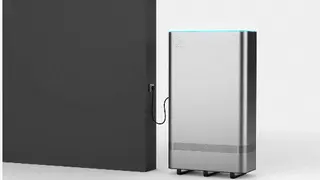Preeti Mehra November 19 was World Toilet Day and for two days this week, Mumbai saw sanitation take centre stage at the World Toilet Summit, 2018.
This was obviously a follow-up of the words of Jack Sim who, as founder of the World Toilet Organization, said, “What we don’t discuss, we can’t improve”. Making the day an annual event, his organisation sends out a message underlying the importance of sanitation, the right to safe and clean toilets for all and the need to make the world open defecation-free.
With the increased hope that technology will help developing countries cope with their sanitation crisis, the Mumbai summit saw several companies showcase their best technologies, some that were affordable for the masses and could be operated with the least amount of water and energy.

Japanese multinational LIXIL, one of the organisers of the summit, focussed on its patented innovation, SATO. These are pan and stool toilets designed specifically for rural areas and can be installed easily with minimum investment. Made of durable polypropylene, the SATO toilets are suitable for use with direct and offset pit installations, septic tanks, sewer connections, and other water-based containment systems. To be cemented into the floor by an ordinary mason, the toilet comes with a trapdoor mechanism that provides an airtight seal against odours and flying insects. After use, the toilet can be flushed with as little as 500 ml of water. The weight of the water opens the trapdoor and removes the waste from the toilet pan.
In India, SATO is encouraging the installation of its V-trap Connection System. Here, the toilet pan is connected to two pits where the waste gets collected and with a switching system between the pans, it has a long lifetime. LIXIL also has another model for water-strapped areas. This is equipped with low-floor trapdoors, which open by the weight of the waste itself and can be rinsed with just 200 ml of water. The trapdoor then automatically closes, blocking flies, insects and unpleasant odours.
At the Summit, urban sustainable designs also drew interest. The Roca Group’s flush-free urinal does not require water or electricity to be used. It employs a cartridge that emits lemon-scented air and prevents unpleasant odours. The cartridge is replaced after every 6,000 cycles. In its second bathroom product, W+W (wash basin + water closet), used water from the washbasin is directed for storage in a cistern. After filtration, it is used for flushing.
Roca’s “water-reuse technology” has been widely appreciated as the company has integrated the basin-toilet equipment into a single piece.
For India, where almost 60 per cent of the population lacks access to sanitation, new designs and innovations could well become viable options.







Comments
Comments have to be in English, and in full sentences. They cannot be abusive or personal. Please abide by our community guidelines for posting your comments.
We have migrated to a new commenting platform. If you are already a registered user of TheHindu Businessline and logged in, you may continue to engage with our articles. If you do not have an account please register and login to post comments. Users can access their older comments by logging into their accounts on Vuukle.